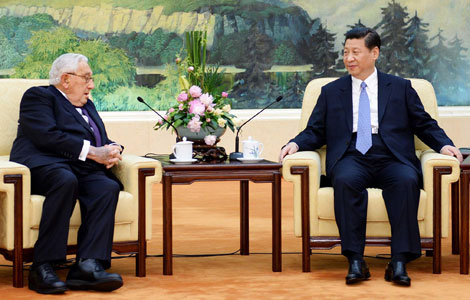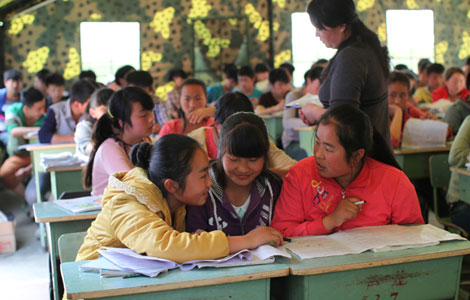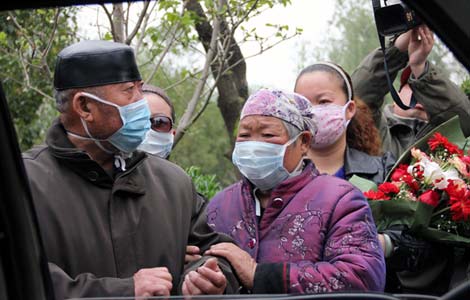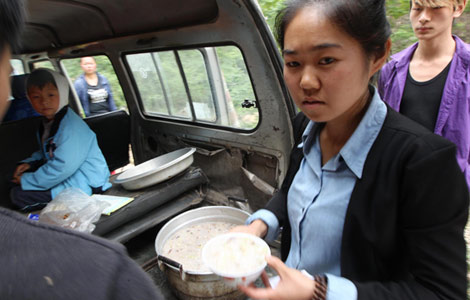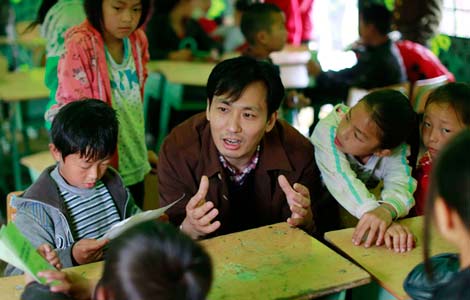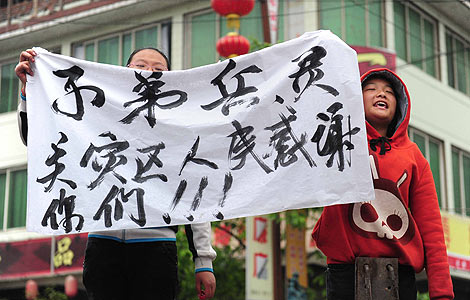Beijing vows to continue easing Korean tensions
Updated: 2013-04-25 08:14
By Zhou Wa in Beijing and Chen Weihua in Washington (China Daily)
|
||||||||
Beijing supports Seoul's and Pyongyang's improving ties and will work with Seoul to push for an easing of tensions on the Korean Peninsula, Premier Li Keqiang told the Republic of Korea's visiting foreign minister on Wednesday.
China has always been committed to the denuclearization, peace and stability on the Korean Peninsula, and strongly opposes all contrary actions, Li said while meeting with Yun Byung-se.
Yun told Li that the ROK appreciates the efforts China has made to maintain peace and stability and realize denuclearization on the peninsula.
ROK President Park Geun-hye and the new government attach great importance to the country's ties with China and would like to further promote exchanges and boost common development, Yun said.
Quiet diplomacy
After weeks of harsh rhetoric from the Democratic People's Republic of Korea, quiet diplomacy is taking shape regarding the country and its nuclear and ballistic-missile ambitions.
Coinciding with Yun's visit to China, Wu Dawei, the special representative of the Chinese government on Korean Peninsula affairs, visited Washington for an exchange of ideas on the DPRK issue with US officials.
On the same day, US Deputy Secretary of State William Burns was in Japan to discuss the DPRK issue.
Beijing and other parties' mediation efforts will create opportunities for resumption of the Six-Party Talks, which have been suspended since 2009, but this will take time, observers said.
Through diplomatic exchanges, Beijing has played an active role to draw all parties back to the Six-Party Talks, said Huang Youfu, a professor on Korean studies at the Minzu University of China.
"When the US-ROK joint military drill ends later this month, Pyongyang will temporarily have no excuse to continue its strong words, so there will be more room for diplomatic talks, and the possibility of communication will increase", he said.
Charles Armstrong, director of Columbia University's Center for Korean Research, said that Wu's visit "is clearly intended to mediate between North Korea and the US. There has been a lot of tough talks on both sides, but dialogue is the only realistic way forward."
Armstrong believes there's a strong likelihood the Six-Party Talks will resume, possibly by summer, but it's unlikely that it could happen immediately, after such a heated period of confrontation.
Shi Yuanhua, director of the Center for Korean Studies under the Institute of International Studies of Fudan University in Shanghai, said Pyongyang and Washington were likely to resume bilateral communication because both sides have the will to do so.
"But the negotiations between Washington and Pyongyang could be very difficult because neither side will give up its initial stance", he added.
Meanwhile, Scott Snyder, a senior fellow in Korean studies at the Council on Foreign Relations, called for more communication on DPRK issues between China and the US.
"We have a very difficult issue on our hands that has only gotten worse. Many people in Washington have expectations that cooperation with China is necessary to manage and solve the current problems, but I think in Beijing there are expectations that the US must take a proactive stance to manage and solve the current problems.
"Probably both sides will have to work more closely together in order to solve these problems," Snyder said.
Quake response hailed
Representing the ROK government, Yun also expressed deep condolences over China's casualties and losses brought by the earthquake in Lushan, Sichuan province.
He spoke highly of the Chinese government's outstanding leadership during the earthquake relief work and offered $1 million to China on behalf of the ROK government.
Li expressed gratitude for the condolences and help from the ROK and again showed appreciation for international support and aid for earthquake relief and reconstruction.
Contact the writers at zhouwa@chinadaily.com.cn and chenweihua@chinadaily.com.cn
Zhang Yunbi in Beijing contributed to this story.
(China Daily 04/25/2013 page11)
Most Viewed
Editor's Picks

|

|

|

|

|

|
Today's Top News
Sluggish growth takes its toll on foreign lenders
Investors find a home in overseas real estate
More Chinese travel overseas, study reveals
Xi meets former US heavyweights
Li in plea to quake rescuers
Canada to return illegal assets
Beijing vows to ease Korean tensions
Order restored after deadly terrorist ambush
US Weekly

|

|
